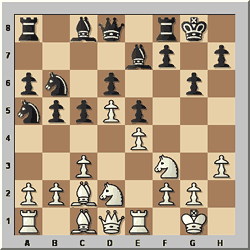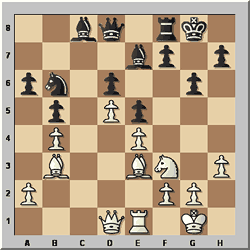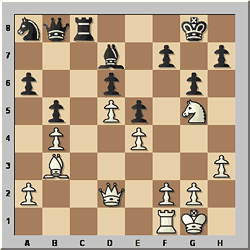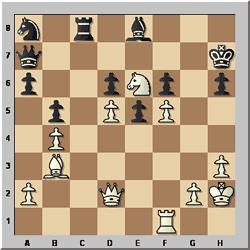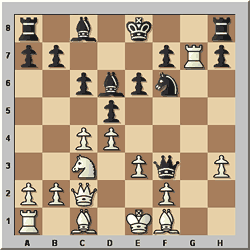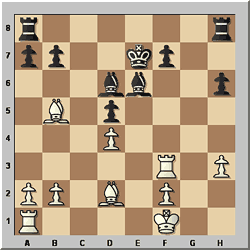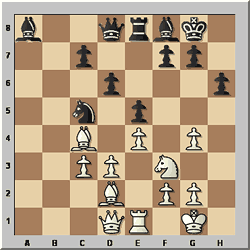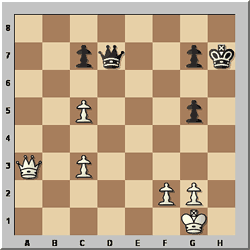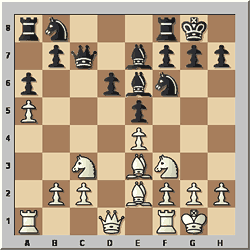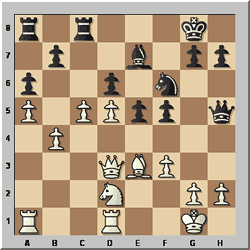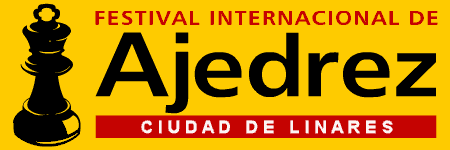

Round ten
Round 10: Sunday, March 4th |
Peter Leko |
½-½ |
Veselin Topalov |
Vassily Ivanchuk |
½-½ |
Peter Svidler |
Vishy Anand |
1-0 |
Magnus Carlsen |
Levon Aronian |
½-½ |
Alex. Morozevich |
|
|
Round 11: Tuesday, March 6th |
Levon Aronian |
- |
Peter Leko |
Alex. Morozevich |
- |
Vishy Anand |
Magnus Carlsen |
- |
Vassily Ivanchuk |
Peter Svidler |
- |
Veselin Topalov |
Games – Report |
|
Standings
Commentary by GM Mihail Marin
The following express commentary was provided by Romanian GM Mihail Marin,
who is the author of a number of very popular ChessBase training CDs and articles
for ChessBase Magazine. GM Marin will study the games of the Morelia/Linares
tournament in greater detail and provide the full results of his analysis in
the next issue of ChessBase
Magazine.

Anand,V (2779) - Carlsen,M (2690) [C96]
XXIV SuperGM Morelia/Linares MEX/ESP (10), 04.03.2007 [Mihail Marin]
1.e4 e5 2.Nf3 Nc6 3.Bb5 a6 4.Ba4 Nf6 5.0-0 Be7 6.Re1 b5 7.Bb3 d6 8.c3 0-0
9.h3 Na5 10.Bc2 c5 11.d4 Nd7 12.d5. This move has become fashionable lately.
In case of 12.Nbd2 , both 12...cxd4 13.cxd4 Nc6 (The old Keres line) and 12...exd4
13.cxd4 Nc6 (The Graf variation) offer Black good counterplay. 12...Nb6 13.Nbd2
g6.
14.b4!? This move was introduced by Leko, just a couple of months ago.
14...cxb4 15.cxb4 Nac4 16.Nxc4 Nxc4 17.Bb3. A novelty. The original game
continued 17.Bh6 Re8 18.Bb3 Bd7 19.Qe2 Nb6 . Black has managed to stabilise the
queenside, while on the kingside he is out of danger anyway. White's advantage
of space will gradually lose its relevance after the following exchanges, making
a draw the most logical result. 20.Rac1 Rc8 21.Be3 Rxc1 22.Rxc1 Qb8 23.Nd2 Rc8
24.Rxc8+ Nxc8 25.f4 Qc7 and the game soon ended in a draw, Leko-Mamedyarov, Moscow
2006.
17...Nb6. This willing knight retreat offers White a wider choice
than in the aforementioned game. 17...Bd7 might be an improvement, since the exchange
on c4 is rather double-edged.
18.Be3. For the time being, the bishop is
better placed here than on h6. White's plan in the next phase of the game is to
spoil Black's queenside coordination. Only later, he will switch his attention
towards the opposite wing.
18...Bd7 19.Rc1 Rc8 20.Rxc8 Bxc8.
A first consequence of the bishop's presence on e3. The generally desirable capture
with the queen, maintaining equal chances in the fight for the c-file, is impossible.
21.Qc2 Bd7 22.Rc1 Na8. Sad necessity. Black cannot allow the infiltration
of the enemy pieces to c7.
23.Qd2 Qb8.
Black is just one tempo away (...Rc8) from reaching a similar position as in Leko-Mamedyarov.
The further course of the game supports Tartakower's statement that a game of
chess is a drama of one tempo...
24.Bg5! Strategically speaking, this exchange
favours Black. However, given the passive position of the a8-knight it also serves
White's attacking purposes.
24...Bxg5?! This only helps White develop his
initiative. Carlsen probably failed to foresee the glorious carrier of the enemy
knight.
25.Nxg5 Rc8?! Still underestimating the danger. Under no circumstances
should Black have left the kingside without defenders. 25...Kg7 , preparing ...h6,
should have been preferred. After 26.f4 h6 27.fxe5
(27.Nf3 f6 is more
or less OK for Black.
) 27...hxg5 28.e6 White has strong compensation for
the piece, but the position is far from simple.
26.Rf1
26...h6. Now it is too late for 26...Kg7 27.f4 h6 because of 28.Nxf7!
Kxf7 29.fxe5+ with a decisive attack.
27.Ne6! Kh7. The knight feels at
home on e6. If 27...fxe6 then 28.Qxh6 , winning.
28.f4 Qa7+ 29.Kh2 Be8
After 29...fxe6 30.dxe6 Be8 31.f5 Black will soon be crushed by the mighty tandem
of white pawns.
30.f5 gxf5 31.exf5. Threatening f6, with a devastating
attack.
31...f6
The tactical phase is over and Black is just hopeless. The e6-knight is just
too strong. 32.Re1 Nc7 33.Rc1 Bd7 34.Rc3 e4 35.Rg3 Nxe6 36.dxe6 Be8 37.e7
Bh5 38.Qxd6 1-0. [Click to replay]

Magnus Carlsen and Vishy Anand analyse after the game

Anand holds an impromptu press conference outside the venue
Aronian,L (2744) - Morozevich,A (2741) [D45]
XXIV SuperGM Morelia/Linares MEX/ESP (10), 04.03.2007 [Mihail Marin]
1.d4 d5 2.Nf3 Nf6 3.c4 c6 4.Nc3 e6 5.e3 Nbd7 6.Qc2 Bd6 7.g4. Aronian
always meets the Meran setup with this sharp line. We can assume that this partly
justifies Morozevich' choice of an opening that had occured only once in his
previous games. 7...Nxg4 8.Rg1 Qf6 9.Rxg4 Qxf3 10.Rxg7 Nf6 11.h3.
11...h6. An interesting opening. The reason why Black spends a whole
tempo to take the g5-square under control can be seen after 11...e5 12.dxe5
Bxe5 13.Rg5 Nd7 14.cxd5 cxd5 15.Rf5 with very active play for White in Tisdall-Sidselrud,
Norway 2002. 12.Bd2 e5 13.Rg3 Qh5 14.cxd5 exd4 15.Ne4 Nxe4 16.Qxe4+ Qe5 17.Qxe5+
Bxe5 18.Rf3 cxd5 19.Bb5+ Ke7 20.exd4 Bd6. 20...Bxd4? would have left the
black king in big danger after 21.Bb4+ Ke6 22.0-0-0. 21.Kf1 Be6.
After a short tactical sequence, the game has calmed down completely. The position
is symmetrical, which makes a draw highly probable. 22.Re1 Rac8 23.Bd3 Rc6
24.Rf5 Rb6 25.b3 Bb4 26.Bxb4+ Rxb4 27.Rxd5 Kf6 28.Rd6 Ke7 29.Rd5 Kf6 1/2-1/2.
[Click to replay]

Ivanchuk,V (2750) - Svidler,P (2728) [C88]
XXIV SuperGM Morelia/Linares MEX/ESP (10), 04.03.2007 [Mihail Marin]
1.e4 e5 2.Nf3 Nc6 3.Bb5 a6 4.Ba4 Nf6 5.0-0 Be7 6.Re1 b5 7.Bb3 0-0 8.h3 Bb7
9.d3 Re8 10.a4 h6 11.axb5 axb5 12.Rxa8 Bxa8 13.c3 d6 14.Na3 b4 15.Nc4 Bf8 16.Bd2
bxc3 17.bxc3 Nb8 18.Ne3 Nbd7 19.Ng4 Nc5 20.Bc4 Nxg4 21.hxg4
21...d5. After thorough preparation, Black finally plays the move that
is characteristic for the Marshall Attack. The similarity induced by the fact
that the e5-pawn is hanging here too is rather feeble. After capturing that pawn,
it will be White who will have to sacrifice material soon.
22.exd5 Bxd5 23.Rxe5
Rxe5 24.Nxe5 Bxc4 25.dxc4 Ne4 26.Qf3. There is no way back. If 26.Nf3? then
26...Bc5! with advantage for Black.
26...Nxd2 27.Qxf7+ Kh7 28.Qf5+ Kg8 29.Qe6+
Kh7 30.Qg6+ Kg8 31.Qe6+ Kh7 32.Qg6+ Kg8 33.Qf7+ Kh7 34.Nd7. Since the perpetual
is always there, White can play for a while, in spite of his material deficit.
34...Ba3 35.c5 Kh8 36.g5 hxg5 37.Qe6 Ne4 38.Qh3+ Kg8 39.Qe6+ Kh8 40.Qxe4 Qxd7
41.Qa8+ Kh7 42.Qxa3.
Finally, White recuperated the sacrificed material with interest, but now it
is Black's turn to force a draw by perpetual. 42...Qd1+ 43.Kh2 Qh5+ 44.Kg1
1/2-1/2. [Click to replay]

Leko,P (2749) - Topalov,V (2783) [B90]
XXIV SuperGM Morelia/Linares MEX/ESP (10), 05.03.2007 [Mihail Marin]
1.e4 c5 2.Nf3 d6 3.d4 cxd4 4.Nxd4 Nf6 5.Nc3 a6 6.Be3 e5 7.Nf3. For the
third time in this tournament, Topalov faces this variation. 7...Qc7.
Deviating from 7...Be7 , as played in the previous two games. 8.a4 Be7 9.a5
0-0 10.Be2 Be6 11.0-0
11...Rc8!? I do not understand the point nehind this novelty. It does
not prevent the knight's jump to d5 and it just misplaces the rook that is supposed
to support the pawn attack on the other wing. However, I am open to accept that
there must be well-hidden point, since Topalov never treats the opening in superficial
way. The normal move is 11...Nbd7.
12.Nd5 Nxd5. One critical test for
Topalov's novelty is 12...Bxd5 13.exd5 Qxc2 . After 14.Rc1 Qf5 15.Qb3 the entire
black queenside is in danger, which makes the a5-pawn a strong candidate to promotion.
13.exd5 Bg4 14.c4 Nd7. 14...Bxf3?! does not yield anything in view of
15.Bxf3 when 15...Qxc4? loses material to 16.Rc1.
15.Nd2 Bxe2 16.Qxe2 f5 17.f3
Nf6 18.b4 Qd7 19.Rfd1 Qe8 20.Qd3 Qh5 21.c5
White's attack looks more threatening than Black's counterplay on the other wing.
21...Rd8. Re-locating the misplaced rook.
22.Nc4 Rac8 23.Rac1 e4 24.fxe4?!
White should not have concealed the control of the g4-square so easily. 24.Qf1
would have allowed him maintain his advantage of space intact.
24...fxe4 25.Qb3
Ng4. Black has strong counterplay now.
26.h3 Nxe3 27.Nxe3 Bg5 28.c6 Rf8
29.Re1 Qh4 30.Qa2 Bf4 31.Qe2 Qg3 32.Nf1 Qd3 33.Qxd3 exd3 34.Rc4 bxc6 35.dxc6 d5
36.Rd4 Rxc6 37.Rxd3 Rc4 38.b5 axb5 39.Rxd5 b4 40.a6 Rc6 41.Rb5 Bd6 42.Ra1 Ra8
43.a7 Rb6 44.Rxb6 Bc5+ 45.Kh1 Bxb6 46.Ra4 Bc5 47.Ra5 Bxa7 48.Nd2 Rd8 49.Rxa7 Rxd2
50.Rb7 Rd4
The complications have resulted into a thematical rook ending. Theory considers
it to be drawn in spite of Black's extra pawn. The further course of the game
will not manage to shatter this verdict.
51.Kg1 Rf4 52.Kh2 h5 53.Kg3 Rc4 54.Kf3
Kh7 55.Rb6 g5 56.Rb7+ Kg6 57.Rb6+ Kf7 58.g4 Rf4+ 59.Kg3 h4+ 60.Kg2 Rc4 61.Kf3
Ke7 62.Ke3 Kd7 63.Kd2 Kc7 64.Rb5 Kc6 65.Rxg5 b3 66.Rg8 Rc2+ 67.Kd1 Kc7 68.Rg7+
Kb6 69.Rg8 Ka7 70.Rg7+ Ka6 71.Rg8 Kb7 72.Rg7+ Kc6 73.Rg8 Rh2 74.Kc1 Rxh3 75.g5
Kd7 76.Rf8 Ke7 77.Rf6 Rg3 78.Rh6 h3 79.Kb2 Kf7 80.Ka3 Kg7 81.Kb2 Kg8 82.Ka3 Kf7
83.Kb2 Kg7 84.Kc1 1/2-1/2. [Click
to replay]
Photos by Jesus J. Boyero
Schedule
Round 8: Friday, March 2nd |
Peter Leko |
½-½ |
Vassily Ivanchuk |
Vishy Anand |
½-½ |
Veselin Topalov |
| Levon Aronian |
½-½ |
Peter Svidler |
Alex. Morozevich |
½-½ |
Magnus Carlsen |
|
|
Round 9: Saturday, March 3rd |
Alex. Morozevich |
1-0 |
Peter Leko |
Magnus Carlsen |
½-½ |
Levon Aronian |
Peter Svidler |
½-½ |
Vishy Anand |
Veselin Topalov |
½-½ |
Vassily Ivanchuk |
|
|
Round 10: Sunday, March 4th |
Peter Leko |
½-½ |
Veselin Topalov |
Vassily Ivanchuk |
½-½ |
Peter Svidler |
Vishy Anand |
1-0 |
Magnus Carlsen |
Levon Aronian |
½-½ |
Alex. Morozevich |
|
|
|
Free day: Monday, March 5th |
|
Round 11: Tuesday, March 6th |
Levon Aronian |
- |
Peter Leko |
Alex. Morozevich |
- |
Vishy Anand |
Magnus Carlsen |
- |
Vassily Ivanchuk |
Peter Svidler |
- |
Veselin Topalov |
Games – Report |
|
Round 12: Wednesday, March 7th |
Peter Leko |
- |
Peter Svidler |
Veselin Topalov |
- |
Magnus Carlsen |
Vassily Ivanchuk |
- |
Alex. Morozevich |
Vishy Anand |
- |
Levon Aronian |
Games – Report |
|
|
Free day: Thursday, March 8th |
|
Round 13: Friday, March 9th |
Vishy Anand |
- |
Peter Leko |
Levon Aronian |
- |
Vassily Ivanchuk |
Alex. Morozevich |
- |
Veselin Topalov |
Magnus Carlsen |
- |
Peter Svidler |
Games – Report |
|
Round 14: Saturday, March 10th |
| Peter Leko |
- |
Magnus Carlsen |
Peter Svidler |
- |
Alex. Morozevich |
Veselin Topalov |
- |
Levon Aronian |
Vassily Ivanchuk |
- |
Vishy Anand |
Games – Report |
|
|
Links







